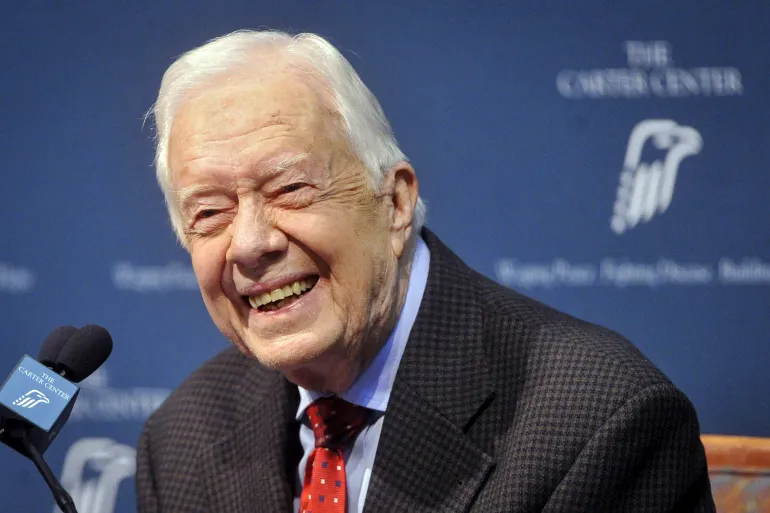AMONG the maize, yam and peanut farms of Savelugu-Nanton, a remote district of northern Ghana, the legacy of Jimmy Carter is less complicated than it is back in the former US president’s homeland.
Thanks to the work of his charity, The Carter Center, locals are nowadays spared the misery of Guinea worm disease – a parasite that breeds in the human belly and emerges through the skin before laying larvae in stagnant pools to await the next victim.
Carter’s work in fighting the bug and tracking votes in poor countries won him a Nobel Prize for Peace in 2002. It followed a presidency that achieved a landmark Middle East peace deal, but was hamstrung by economic woes and the Iranian hostage crisis.
He died on Sunday, aged 100, the Carter Center announced. He had entered hospice care in February 2023, electing to stay home after a series of short hospital stays. The former president had been diagnosed with cancer in 2015 but had responded well to treatment. At 100, he was the longest-lived president of the United States.
During six decades of politics, aid work and diplomacy, Carter “was committed to ideals like human rights, peace, and improving human life”, Steven Hochman, research director at The Carter Center, told Al Jazeera.
“He didn’t just want talk, he wanted action,” Hochman said. “Whether this was through monitoring elections in Latin America or witnessing the terrible suffering from Guinea worm disease in Asia and Africa, and working to eradicate it.”
Carter grew up on the red clay soil of rural Georgia during the Great Depression. He sold boiled peanuts on the streets of Plains, his hometown, and ploughed the land with his family. His father James “Earl” Carter, was a peanut farmer and warehouseman; his mother, Lillian, was a nurse.
He married Rosalynn Smith, a family friend, in 1946. The couple celebrated their 76th wedding anniversary in July 2022, a year before the former first lady died in November 2023.
After a seven-year US navy career, Carter returned to his home state of Georgia, where he garnered national attention as a Democrat state governor for his prudent management, winning a spot on the cover of Time magazine as a symbol of the “New South”.
Running for the presidency, Carter styled himself as an outsider to Washington politics, which were stained by the Watergate scandal and the Vietnam War. His “Peanut Brigade”, a group of friends from Georgia, crisscrossed the US and trumpeted their candidate as a straight-talking man of principle.
“Carter’s election in 1976 promised to redeem the nation from the sins of Vietnam and Watergate,” Randall Balmer, a historian and author, told Al Jazeera. “He aspired to restore faith in government, but betrayal during the Lyndon Johnson and Richard Nixon years had already given way to cynicism.”
In the White House, Carter’s trademark candour did not always translate into political victories. Many of his progressive social and economic plans hit logjams in Congress; an inability to translate ideals into legislative reality sapped his popularity.
The United States was mired in the stagflation woes of low economic growth, unemployment and high inflation, brought about by an energy crisis from the early 1970s. Carter’s solution, tackling US dependence on foreign oil via taxes and green energy, was quashed in the Senate.







